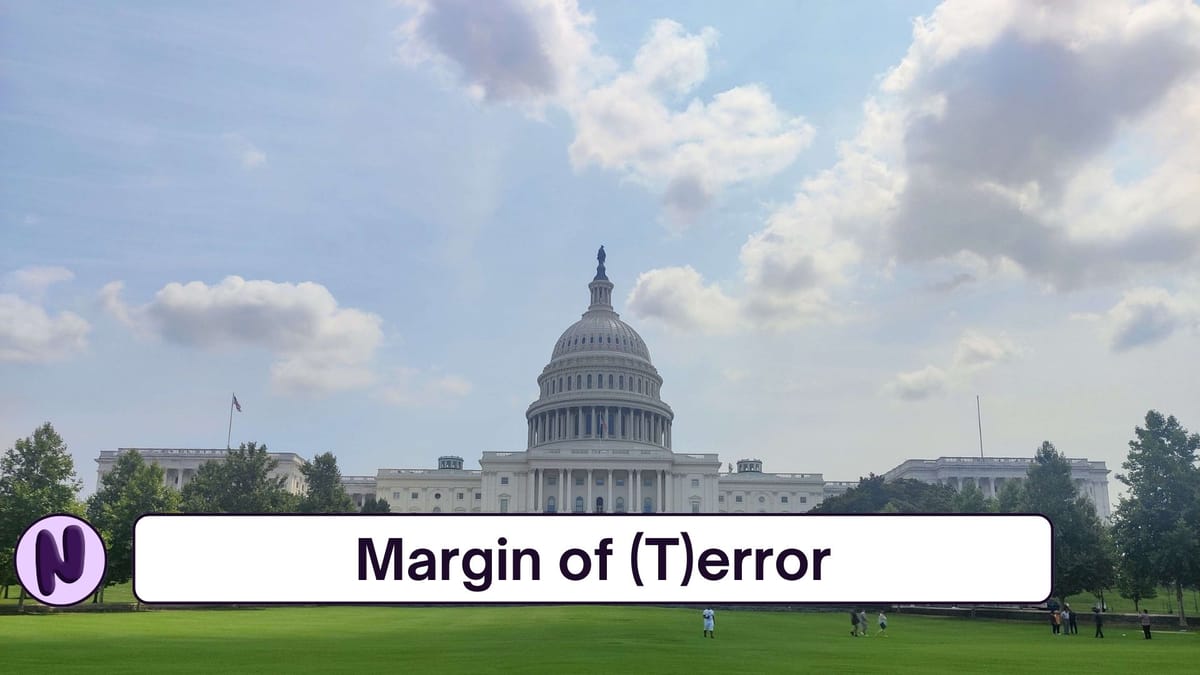Margin of (T)error
For a race that feels so consequential, that will make history whichever way it goes, it is very, well, spooky, to have no real idea who will become President.

It feels like ages, though in reality not that long since it seemed that Donald Trump would be swept back into office in 2024. Looking at swing state poll numbers it looks like Biden’s failure to communicate his achievements had cost him big time. Biden’s career-ending debate performance in late June seemingly confirmed that, and the prospect of a late-game hospital hand-pass from Biden to Kamala Harris had the Democrats doing their ritual ‘bed-wetting’. There was no sign such a high-risk manoeuvre would work, or that other Democrats would even want to play ball. Harris however transformed, seemingly overnight, from a terminally unlikable side-show to an energetic breath of fresh air. Yet despite that flood of dopamine that initially coursed through Americans’ brains when Biden dropped out and Harris stepped in, there’s no indication of who will win. The polls are so close that they are within the margin of error. This means that on election day, the polls could be bang on the mark, or they could be majorly underestimating either candidate. With the shaky horrified eyes of the world peering into America’s window, it seems the margin of error has become the margin… of terror! (Happy Halloween everyone). Now, acknowledging that the polls can’t project a winner, let’s see if the past can tell us anything.
History is against both candidates. Harris’ campaign lives under the shadow of the widely unpopular administration she serves in. Worse still, only 28% of voters feel like the country is on the right track. Biden has just a 40% approval rating, and no incumbent party has won re-election on such low numbers. For Trump, it is his own precedent that is against him. The last President who served 2 terms non-consecutively left office 127 years ago. Trump, though, is sort of the precedent-breaking guy, having just this year become the first person since Richard Nixon to become the Republican Party’s candidate for President three times.
History then also has mixed views of the viability of either candidate. There is one reliable source for predicting these things though. Historian Allan Lichtman has a ‘13 keys to the White House’ system which lays out the criteria needed for the incumbent party to win re-election. His system has correctly predicted who became President in 9 out of the last 10 elections. According to him, Harris has 8 of these keys, and with less than 6 keys going against her is thus projected to be the winner under the model. Some of these ‘keys’ include ‘The sitting president is running for reelection’, which is a point for Trump since Biden has stepped down. One ‘key’ that goes to Harris is ‘The White House party avoided a primary contest’, which she and Biden had won the point for. Biden, because there was no one competitive enough with him in the primary to pose a real threat, and Harris because no one at all stepped up to challenge her nomination.
The thing that casts Lichtman’s prediction in doubt is the time the wrong man became President. In 2000, Al Gore was predicted winner, and Lichtman argues he should have won. Due to fears of machine error, many voters, in addition to hole-punching the circle next to their preferred candidate’s name, also wrote in the candidate’s name on the ballot to ensure their voting intention could not be mistaken. However, doing so caused said ballots to be counted as overvotes and thus be rejected. In a report to the US Commission on Civil Rights, Lichtman demonstrates that in Florida votes cast by black voters were significantly more likely to be rejected, noting in a supplemental report that 14% of votes cast by black voters were rejected, compared to 3.5% of votes cast by non-black voters. Since the majority of these voters were voting for Al Gore, if their votes were counted fairly, Al Gore would have won Florida, and the presidency. Thus, while Lichtman maintains the model never fails, sometimes, clearly, democracy is not implemented as much as it should. With arson attacks already occurring in mail-ballot drop boxes, and fears of further violence and instability, not even the seemingly infallible Lichtman can really guarantee anyone a winner.
Given how tight the race is, a few handfuls of votes here and there could make or break either campaign. While the Biden Administration has been happy to treat the War in Gaza and now Lebanon as a rock in their shoe, it may become the straw that breaks their back. The 200 thousand-plus Arab Americans in Michigan seem set to punish Harris at the ballot box, most likely through not voting at all. Both Trump and Biden, respectively in 2016 and 2020 won the state by less than 200 thousand votes. Both towns in Michigan with large Arab populations and towns with large Jewish populations in the other crucial state of Pennsylvania have been the target of a very strange ad campaign. An Elon Musk-backed ad campaign has run in Michigan positively touting Harris’ commitment to standing with Israel, and at the same time run ads in Pennsylvania accusing her of trying to stop Israel from defeating Hamas, and siding with Pro-Palestinian protestors.
It has also been reported that Trump has called the Israeli Prime Minister and urged him not to agree to a ceasefire, as it is better for his election chances if the war continues given the bind the Harris campaign is in with this issue.
The war in Ukraine on the other hand could hurt Trump, given that his statements on Ukraine are tantamount to dog whistles, which to those who are listening closely seem to indicate he would happily throw Ukraine under the bus. If Trump were to abandon Ukraine, fears of a Russian attack would only increase in neighbouring countries. Harris in her debate with Trump put best why this is an issue for him:
‘Why don’t you tell the 800,000 Polish Americans right here in Pennsylvania how quickly you would give up for the sake of favour and what you think is a friendship with what is known to be a dictator who would eat you for lunch?’
Trump’s closing pitch at his rally in Madison Square Garden recently drew a lot of flak, given that the opening speaker called Puerto Rico ‘a floating island of garbage’ and tried to joke that ‘They [Latinoes] love making babies’. As Black and Latino men have been going to Trump in small numbers, it has been a fear that this numerically small number of voters could have a big impact. However, once again, Trump has demonstrated why the Republican party as a whole has been outperforming him with Latino voters. Trump’s tall frame seems cramped between the high floor and low ceiling he is able to accomplish with his primary vote. His campaign’s last-minute outburst may very well place his racist rhetoric, rather than the economy, in the front of some voter’s minds. Holding the rally in the spot American Nazis held a rally in 1939 was not the mistake in that respect; many political events have occurred there. It is the rhetoric on display at that venue that has mixed with the historical echo which may have formed a toxic cocktail the Trump campaign can’t seem to stop injecting themselves with.
Harris’s final pitch purposefully used a historic site as well. She stood at the same place Trump had as he incited the January 6 mob to storm the capitol. She highlighted Trump’s desire for revenge against his enemies: ‘On day one if elected, Donald Trump would walk into that office with an enemies list. When elected I will walk in with a to-do list.’
For a race that feels so consequential, that will make history whichever way it goes, it is very, well, spooky, to have no real idea who will win, much less who will become President. The scariest thing is what is ahead. We are currently fearing the current conflicts. How will Gaza look like under a Harris administration that would feel as though it got away with its support for Israel? What would Ukraine look like under a Trump administration that seems cuddly with Putin and eager to take credit for ending wars with disastrous effect? In 2000 America was in a similar predicament. The Yugoslav Wars were winding down after years of conflict and genocide. It was a major news issue, but not the key issue on voter’s minds. Not even a year into George W. Bush’s term, the Twin Towers were attacked, and Bush made the fateful decision to invade Afghanistan and later Iraq in his ‘war on terror’. Suddenly, that not-so-high-stakes election became more consequential than anyone could have anticipated.
https://www.theatlantic.com/ideas/archive/2024/10/bad-bunny-puerto-rico-trump/680453/
https://www.usccr.gov/files/pubs/vote2000/report/appendix/lichtman/ltrpt.htm
https://www.usccr.gov/files/pubs/vote2000/report/appendix/app10.htm#_ftn1



